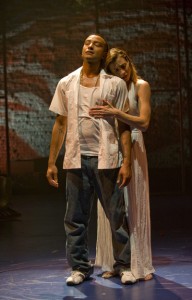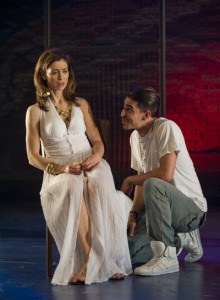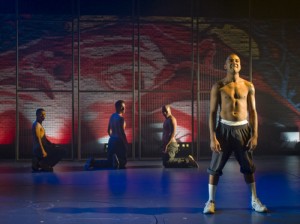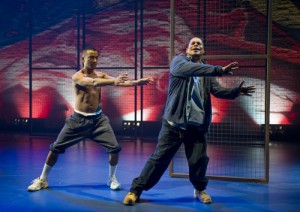OEDIPUS REX POTENTLY UPDATED TO THE BARRIO
Oedipus El Rey is Luis Alfaro’s vision of Sophocles’ Oedipus Rex seen through the prism of modern Latino life, specifically gang culture as it melds with the traditions and values of the barrio in east Los Angeles. The drama at Victory Gardens is powerful and riveting, which proves that a classic remains a classic, whether it’s set in ancient Greece or the modern prisons and barrios of California.
 Alfaro stays close to the basic narrative of the Sophocles tragedy, with young Oedipus fulfilling a prophecy that he would kill his father, in this case the gangland kingpin Laius (Alfaro retains all the Greek names of his characters). After unknowingly killing his father, Oedipus unknowingly marries his mother and Laius’s widow, Jocasta. At the end of the story the truth is unveiled. Jocasta hangs herself and Oedipus blinds himself with pins from Jocasta’s jewelry and goes into exile. Previous knowledge of these events make this production no less spellbinding. In fact, viewers familiar with the Sophocles original will find Oedipus El Rey fascinating as they follow how the playwright shapes the tragedy to the worldview of Latino life in the barrio. Patrons with no knowledge of the original Greek drama will still have much to appreciate in the power of the story and the energy of the language. The narrative is a grabber 2,500 years after it was written and it doesn’t matter that the characters wear prison clothes instead of togas and live among enclosing steel security fences instead of stately Greek columns.
Alfaro stays close to the basic narrative of the Sophocles tragedy, with young Oedipus fulfilling a prophecy that he would kill his father, in this case the gangland kingpin Laius (Alfaro retains all the Greek names of his characters). After unknowingly killing his father, Oedipus unknowingly marries his mother and Laius’s widow, Jocasta. At the end of the story the truth is unveiled. Jocasta hangs herself and Oedipus blinds himself with pins from Jocasta’s jewelry and goes into exile. Previous knowledge of these events make this production no less spellbinding. In fact, viewers familiar with the Sophocles original will find Oedipus El Rey fascinating as they follow how the playwright shapes the tragedy to the worldview of Latino life in the barrio. Patrons with no knowledge of the original Greek drama will still have much to appreciate in the power of the story and the energy of the language. The narrative is a grabber 2,500 years after it was written and it doesn’t matter that the characters wear prison clothes instead of togas and live among enclosing steel security fences instead of stately Greek columns.
Oedipus is now a strutting, arrogant young man who mocks the religious conventions of barrio life. After being paroled from prison, he moves in with Creon, Jocasta’s brother and wannabe replacement as crime king in the barrio. Oedipus meets Jocasta, Creon’s sister, and after some preliminary banter, they becoming steamy lovers, displayed in a long erotic scene the like of which audiences have never seen in any previous Victory Gardens production. The couple marries as their destiny is played out to its violent conclusion.
Oedipus stands as a symbol of rebellion against the gods and their powers, with his bravado and hubris finally leading to his destruction. Alfaro preserves the ancient Greek conviction that one flaunts the gods at one’s peril. Once the deities have laid out a destiny, it’s irreversible and the individual struggles against his fate in vain, no matter how much pride and disbelief he flaunts.
Alfaro absorbs some of the tropes of Greek tragedy, especially in the usage of both a chorus (called coro) and short, staccato dialogue. Alfaro’s language is a peppery and poetic blend of English and Spanish, often eloquent and sometimes profane. Spectators unschooled in Spanish will miss a good bit of the dialogue when it shifts into the colloquialisms of prison and the barrio. A two-page glossary of Spanish words and phrases is provided in the playbill but won’t be of much help to listeners as the patois whizzes past their ears. But the bilingual script doesn’t create any significant impediments to following the story, and the performers deliver the language with such passion and even humor that the Spanish-challenged patron shouldn’t miss much in meaning and context.
On a local level, Oedipus El Rey demonstrates the depth of Hispanic acting talent in the Chicago area. All seven members of the ensemble are local actors who have been active in Latino theater and occasionally appeared in mainstream Chicago plays, but based on the superiority of the Victory Gardens production, they rarely get the kind of exposure they clearly deserve.
 As Oedipus, Adam Poss is brilliant. He is on stage the entire play, speaking much of the dialogue as he carves out a figure of brash self-confidence. He’s ruthless in his ambition to take over as king of the barrio yet tender in his love affair with Jocasta. Poss triumphs in a role that demands stamina as well as command of raw and oversized emotions.
As Oedipus, Adam Poss is brilliant. He is on stage the entire play, speaking much of the dialogue as he carves out a figure of brash self-confidence. He’s ruthless in his ambition to take over as king of the barrio yet tender in his love affair with Jocasta. Poss triumphs in a role that demands stamina as well as command of raw and oversized emotions.
Charin Alvarez is splendid as Jocasta, a barrio-hardened woman who still yearns for love after enduring the abuses of the headstrong Laius. Her love scene with Poss is warm and unaffected, in spite of the nudity, and totally persuasive. As Laius, Madrid St. Angelo is the model of the bully preoccupied with preserving his power, outwardly proclaiming he isn’t afraid of any gods but still hedging his bets by ordering the newly born Oedipus killed. Arturo Soria is fine as Creon, as self-centered and arrogant as Oedipus. Eddie Torres has some sensitive moments as the blind Tiresius (who knows the truth about Oedipus’s fate), and brings the blind old man alive as the only compassionate figure in the play. Jesse David Perez and Steve Casillas round out the ensemble as coros, but all the men in the cast form a pungent ensemble, replicating the rough brotherhood and omnipresent brutality of prison existence and the dangers of the gang-infested barrio.
The basic setting is the prison with sliding chain-link steel panels used to reconfigure the playing area (Kevin Dipenet designed the flexible and atmospheric set). A blood-red abstract projection at the rear of the stage is a reminder that we are watching a violent world, made all the more palpable by Jesse Klug’s lighting and Mikhail Fiksel’s sound. The six male performers mostly wear anonymous prison outfits, sometimes reverting to the civilian clothing of the barrio. As the only female in the play, Jocasta wears a loose fitting gown, easily removed for her extended nude scene with Oedipus (costumes by David Hyman). Director Chay Yew uses the entire theater, with actors moving up and down the aisles, occasionally unsettling the audience with their menacing stares. Ryan Bourque designed the fight choreography and movement’”and there were plenty of both.
The program notes suggest that there are parallels between the play and the street violence plaguing Chicago in real life. I didn’t find the play a cautionary tale with applications to modern society, but that doesn’t detract from Oedipus El Rey as a vibrant and moving drama by a major voice in American theater (Alfaro’s Bruja, a modern Latino take on Medea, recently played The Magic Theater in San Francisco). Fortunately, this gripping production is also a showcase for Hispanic performers who are definitely deserving of wider recognition.
photos by Michael Brosilow
Oedipus El Rey
Victory Gardens Theater, 2433 N. Lincoln Ave
Tues-Fri at 7:30; Sat at 3 & 7:30; Sun at 3
ends on July 29, 2012
for tickets, call 773.871.3000 or visit Victory Gardens
for more shows, visit Theatre in Chicago



